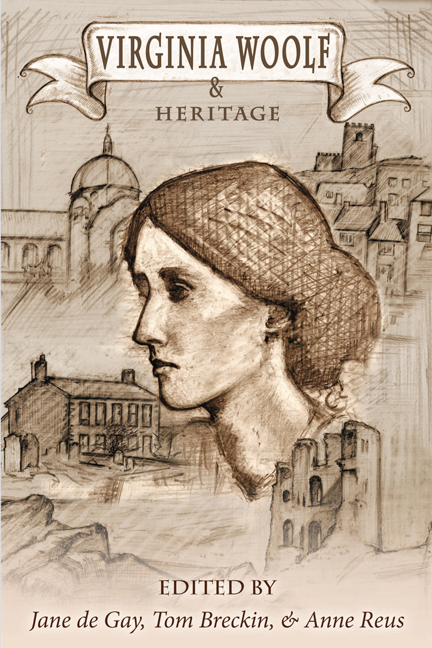Book contents
- Frontmatter
- Contents
- Introduction
- List of Abbreviations
- HERITAGE: A DEBATE
- HERITAGE, EDUCATION, AND MENTORING
- HERITAGE SPACES
- LITERARY AND CULTURAL HERITAGES
- QUEER PASTS
- MODERNISM AND HERITAGE
- WRITING LIVES AND HISTORIES
- The Play of Fact and Fiction in Virginia Stephen's “The Journal of Mistress Joan Martyn”
- “Writing the history of my own times”: Virginia Woolf and the Diary
- Heritage, Legacy, and the Life-Writing of Woolf and Rhys
- Life as Legacy: Truth, Fiction, and Fidelity of Representation in Biographical Novels Featuring Virginia Woolf
- From the Author to the Icon: A Heritage of Virginia Woolf in French Biographies and Biofictions
- Flights of Archival Imagination: Woolf 's Transcendent Materiality in Contemporary “Archive Fiction”
- WOOLF'S LEGACIES
- FINALE
- Notes on Contributors
Life as Legacy: Truth, Fiction, and Fidelity of Representation in Biographical Novels Featuring Virginia Woolf
from WRITING LIVES AND HISTORIES
- Frontmatter
- Contents
- Introduction
- List of Abbreviations
- HERITAGE: A DEBATE
- HERITAGE, EDUCATION, AND MENTORING
- HERITAGE SPACES
- LITERARY AND CULTURAL HERITAGES
- QUEER PASTS
- MODERNISM AND HERITAGE
- WRITING LIVES AND HISTORIES
- The Play of Fact and Fiction in Virginia Stephen's “The Journal of Mistress Joan Martyn”
- “Writing the history of my own times”: Virginia Woolf and the Diary
- Heritage, Legacy, and the Life-Writing of Woolf and Rhys
- Life as Legacy: Truth, Fiction, and Fidelity of Representation in Biographical Novels Featuring Virginia Woolf
- From the Author to the Icon: A Heritage of Virginia Woolf in French Biographies and Biofictions
- Flights of Archival Imagination: Woolf 's Transcendent Materiality in Contemporary “Archive Fiction”
- WOOLF'S LEGACIES
- FINALE
- Notes on Contributors
Summary
Despite their conviction that life-writing should be seen and practiced as an art, scholars of biography tend to be suspicious of invention. Commenting on the first biofictional depiction of Woolf, The Hours, Hermione Lee, while admitting that Cunningham's was an “absorbing novel” which “makes a sensitive reinvention of Woolf 's inner life,” still felt the need to register her “reservations” about the text, which she traced to “a biographer's squeamish reluctance to see a real person made over into a fictional character, with made-up thoughts and speeches” (Lee, Virginia Woolf 's Nose, 50). Among the things that Lee finds most disturbing are the details, such as clothing or vocabulary (50, 53–55). But is there really a univocal connection between character invention and the misrepresentation of details?
In an early critical approach to the question of fictional biography, Ina Schabert notes that a biographical novel, as distinct from a factual biography, “is known to be fictitious but…brings out a truth about a real person in a more poignant way than would a factual account” (Schabert 6). Her words, echoing the ones of André Maurois (“that profounder truth which is the poetical truth”), hint at a quality of biographical fiction she calls “poetic essentiality,” the capacity to capture the specific and raise it “to metonymic or even symbolic status” (Schabert 6).
Woolf, herself the author of a fictional biography that allows for the wildest flights of imagination and mocks the conventions of biography-writing, seems to favour the second perspective: it is not the details that matter, but the truth of personality. Even before writing Orlando, her rebellion against the notion that characters need to be “real” in order to survive (CE1 325) and her plea against a unique definition of ‘character’ (324) seem to point to a sense that she, too, would be better portrayed through fiction. Novelists are going to assign “made-up thoughts and speeches” to the real Mrs Woolf? They are going to make readers see in her what they, the authors, want to make visible? But that is precisely what Woolf would have writers do with her imaginary Mrs Brown. “Otherwise, they would not be novelists” (ibid., 326).
- Type
- Chapter
- Information
- Virginia Woolf and Heritage , pp. 208 - 216Publisher: Liverpool University PressPrint publication year: 2017



